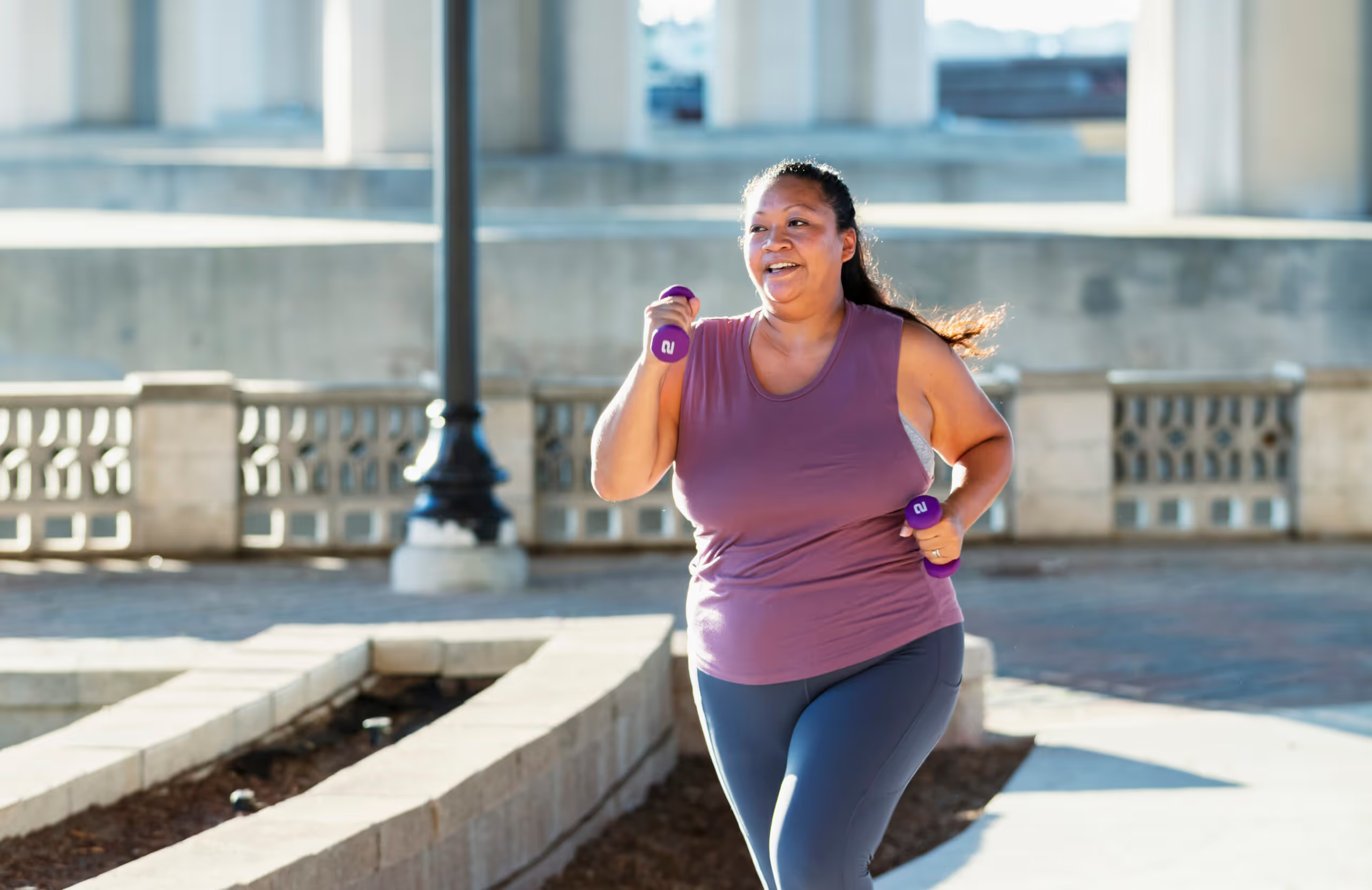Walking is a basic human skill, learned at a very young age and an important part of our daily lives. Walking is also a form of physical activity, which we have been taught is a key component of weight loss and improving health. But can walking help you lose weight? Let’s take a look at the research.
Can you lose weight by walking?
The technical answer to this question is yes, you can lose weight by walking. A review of multiple small studies tells us that on average, persons with overweight and obesity who were sedentary and then increased their walking by 1-2 miles per day lost about 1 kg (that’s 2.2 pounds). But that’s probably not the amount of weight loss you were hoping for. Keep in mind, what this study doesn’t tell us is how increasing the speed or duration of walking beyond 2 miles per day might play a role and perhaps offer additional weight loss benefit. However, other studies evaluating the effects of physical activity for weight loss suggest the same - we get very modest weight loss from adding in physical activity alone.
The reality is that physical activity, including walking, is very important for our overall health and weight loss maintenance, but the act of losing the amount of weight that is desired by most people requires pairing physical activity such as walking with changes in diet. When we review findings from the National Weight Control Registry, a study looking at people who have successfully maintained at least a 30-pound weight loss for one year or more, 98% of participants reported they had to modify their food intake in some way and 94% reported they increased their physical activity level; so most people are doing both to get significant, long-term results.
How much do you have to walk to lose weight?
This is going to vary from person-to-person for many reasons. If you’re currently inactive, even short bouts of walking may be enough to see some change in the scale. On the contrary, if you’re already walking 10,000 steps per day, the amount required is going to be higher. Our bodies get efficient at doing any form of physical activity, so the amount of calories burned from doing the same activity over and over is likely going to decrease with repetition. And, as discussed, it is going to depend on what changes you are making in your diet.
For overall health, the Physical Activity Guidelines for Americans recommends 150 to 300 minutes of moderate-intensity physical activity such as brisk walking each week, ideally spread across at least 3 days. But if you’re currently not getting much physical activity, increasing your activity level by even 10 minutes per day can lead to improvements in your overall health.
Other health benefits of walking
While walking alone doesn’t cause significant weight loss, it does benefit our health in so many ways independent of weight change, so it is still an important part of a healthy lifestyle and here’s why:
- Weight loss maintenance - Regular physical activity is a key behavior for maintaining weight loss and preventing weight gain. Based on the National Weight Control Registry, 90% of people who maintain a significant weight loss exercise on average an hour per day and many of them report walking as their most frequent form of exercise.
- Improved blood sugar, blood pressure, and cholesterol - There are multiple studies that tell us how walking improves blood sugar, blood pressure, and cholesterol levels and decreases the need for medications to treat these common conditions. Additionally, it appears that faster walking and longer durations provide the most benefit.
- Reduced stress and improved mood - Physical activity significantly improves stress level and mood and this is confirmed in many studies. Interestingly, improvements in mood were seen after just 6 minutes of walking, so it doesn’t take a big time commitment to reap the benefits for your mental health.
- Reduced risk of cardiovascular disease - As a result of all of the above improvements, regular walking activity reduces the risk of cardiovascular disease, the leading cause of death in the United States.
- Decreased joint pain - It sounds counterintuitive, but walking and other forms of exercise help to relieve pain and stiffness associated with arthritis. Starting slow and for short durations is recommended. If not tolerated, consider other forms of non weight-bearing exercise such as swimming or bicycling and discuss a plan with your healthcare provider.
- Preserved lean muscle mass and cardiovascular fitness - These are possibly the most important benefits for quality of life. As we age, we experience decreases in lean muscle mass and cardiovascular fitness which affects our ability to get around and care for ourselves. Incorporating walking and other exercise into our daily routine is a way to preserve lean muscle mass and cardiovascular fitness so that we can remain independent, travel, play with grandkids - all those things we want to do as we get older!
How can you incorporate walking into your weight loss program?
The great thing about walking is that it can be easily incorporated into your daily routine and it doesn’t cost anything. Here are some ideas to help you get walking more:
- Take a walk on your lunch break or after dinner. Not only will this help you to get more active, but it can help with food digestion and blood sugar levels as well. Ask your family members to join you and catch up on the day's events.
- Walk your dog. Your furry friend needs exercise, too! Use him as motivation to get out more often.
- Take a call while going for a walk or, better yet, meet up with a friend for a walk to catch up.
- Schedule a walking meeting with your colleagues. Take it outside if you can for an even greater boost in mood.
- Walk to work or park your car farther away if walking to the office isn’t an option.
- Join a walking group - a great way to meet new people and socialize as well!
- Check out local parks for trails that could make for more interesting and challenging walks.
- Use a fitness tracker for logging your steps. Set goals that are achievable and then increase your goal once you’ve hit that one consistently.
How Form Health can help you lose weight
Form Health treats lifestyle factors that can contribute to weight gain. When customizing weight loss programs, our doctors and dietitians consider all elements of a patient's life including medical history and needs. It’s important to us that you have a personalized plan that feels right to you and works with your everyday life. Form uses behavioral support, nutrition, physical activity and FDA-approved medication, if appropriate, as tools to help you reach your goals. Take our quiz to find out if you’re a candidate today.




